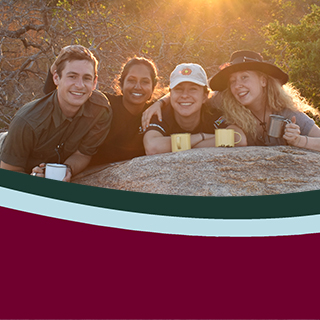Global Leadership Seminars
Fall 2021
Can Giving Change the World?: Engaging Social Responsibility through Philanthropy
Greg Larson- Monday, Wednesday, Friday 10:00-10:50 AM
This course examines the relationship between the individual and society by addressing the question: How do individuals and organizations address pressing social problems to create meaningful change? Through the lens of philanthropy, this course introduces students to social responsibility and some of the big problems facing society. We will learn about how philanthropists and social entrepreneurs are creatively combating the most pressing social problems such as poverty, environmental degradation, and disease at local, national and global levels. A large portion of the course focuses on a hands-on grant-making project where the class will explore community needs, solicit grant proposals, visit prospective grant finalists and, ultimately, give away $10,000 in real money to local nonprofits.
Energy Conflict in a Changing Climate
Peter McDonough - Monday, Wednesday, Friday- 11:00-11:50 AM
Energy Conflict explores the wicked problems of a complex and ubiquitous energy system. Coal towns facing uncertain futures, nuclear power plants exploding, oil pipelines stuck in court, and the growing carbon footprint of the Global South all present logistical and ethical dilemmas. By exploring these conflicts, students will explore ideas of intergenerational justice, energy dependence, cultural trauma, equity, and much more in the context of climate change and globalization. Guiding questions, in-class activities, iterative discussions, and formal debates frame each major issue to paint a picture of informed leadership in situations where there are no “right” answers.
From Seeds to Sovereignty: Agriculture Past, Present and Future
Caroline Stephens - Tuesday and Thursday 3:30-4:50 PM
Seeds to Sovereignty guides students through the 10,000-year-old history of agriculture—from plant domestication to colonization, industrialization, and contemporary efforts in sustainable agriculture. This course integrates diverse, global, and interdisciplinary perspectives using poetry, podcasts, film, and scholarly readings, as well as field experiences at the University’s PEAS Farm. With this foundation, students will analyze and debate an essential question facing humanity: How do we feed the world? To answer this question, we’ll examine various forms of cultural and environmental renewal through agriculture—from the Via Campesina peasant farmer movement to projects in native seed rematriation—as students develop a vision for a more healthy, equitable, and resilient agriculture.
Global Issues and Public Diplomacy
Deena Mansour - Tuesday and Thursday 9:30-10:50 AM
Diplomacy is managing America's relationships with foreign governments and international organizations. Public diplomacy informs the world of who we are as Americans. Our nation's foreign policy is only successful if we use public diplomacy to learn about the people outside our borders and understand how they perceive our policies. You’ll learn how this is done through access to influential decision-makers as well as by engaging with students in Asia and/or the Middle East. Diversity and inclusion is a critical theme woven throughout. Assignments include simulating a press conference and developing a public diplomacy storytelling campaign to hone practical communication skills.
Legacies of Settler Colonialism
Brittany Palmer - Monday and Wednesday 4:00-5:20 PM
What is settler colonialism and how can an understanding of the concept help us address global issues and situate our own identities? Because neither white supremacy nor settler colonialism can be relegated to the past, together they inform present-day cultural, environmental, and political issues in the U.S. and abroad. In this course, students will engage with the multidisciplinary field of Settler Colonialism Studies through film, literature, podcasts, and additional media to situate critical global issues. Students will explore settler colonialism theory, examine projects of settler colonialism through case studies, and imagine the possibilities for a more just future.
Migration and Refugees in the Modern World
Gillian Glaes - Tuesday and Thursday 11:00-12:30 PM
There are over 80 million displaced persons in the world today, more than any other time in human history. This class will explore historical and contemporary issues related to migration, refugees, and asylum seekers around the world over the course of the twentieth century and culminating with the current refugee crisis. We will also engage with local resettlement efforts here in Missoula through presentations by and conversations with Soft Landing Missoula and the International Rescue Committee, both of which work to resettle and integrate refugees in our local community. (This class also fulfills a requirement for UM's Migration Studies Certificate, for those interested in pursuing an additional credential.)
Sustainable Development Goals 2030: Global Vision and Local Actions
Phyllis Ngai - Tuesday and Thursday 2:00-3:20 PM
The 2030 Agenda for Sustainable Development, adopted by all U.N. member states, provides a blueprint aimed at bringing about sustained peace and prosperity for people and the planet. The Sustainable Development Goals capture a global vision for solving problems such as hunger, inequality, climate change, and shortage of clean water. Transnational-aid agencies condition sustainable-development initiatives through organizational priorities derived from their global perspectives. How do civil-society organizations around the world “translate” the global vision into local actions? Through collaborative-learning activities, students will explore what the SDGs mean in different places and how best to achieve a sustainable future for all. (This class also fulfills a requirement for UM's International Development Studies Minor, for those interested in pursuing an additional credential.)
